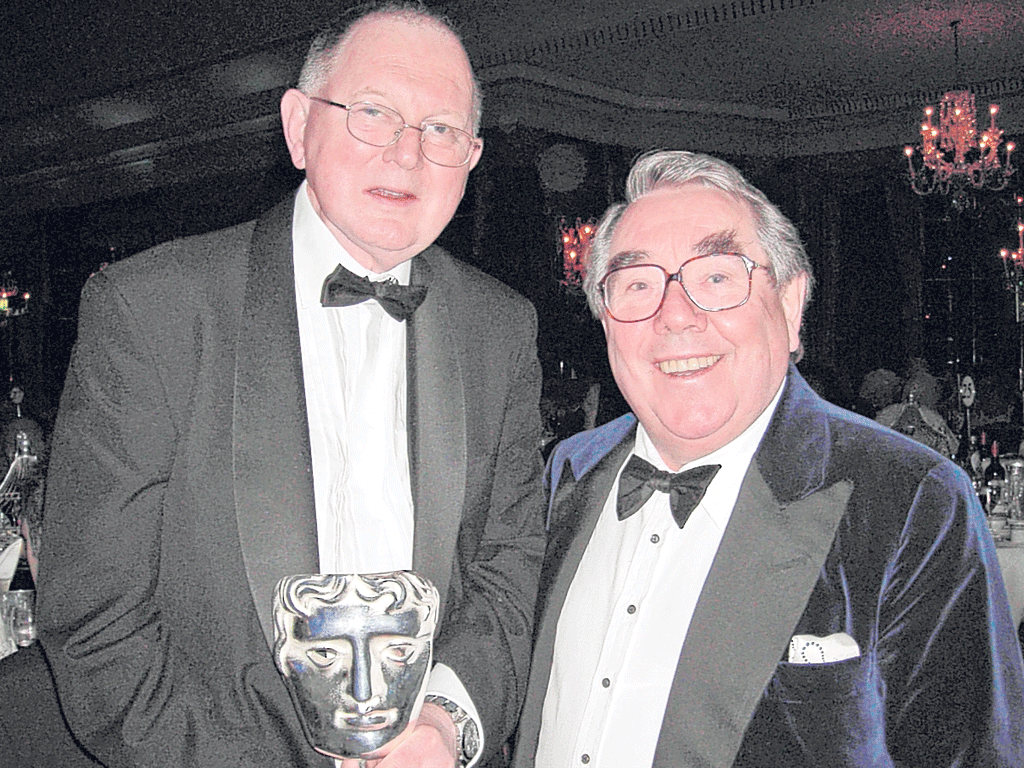Michael Hurll: Producer and director acclaimed for 'The Two Ronnies' and 'Top of the Pops'

Michael Hurll was something of a Father Christmas to the British public for much of his career as a television producer: an unseen provider of festive gifts, some cherished for years to come, some as ephemeral as a Christmas cracker. In a heyday of television light entertainment he triumphed with festive editions of The Two Ronnies and Top of the Pops, but he would be the first to admit that sleigh rides with Little and Large and Cannon and Ball at the helm haven't stood the test of time quite so well.
With the appointment of Bill Cotton as Head of Light Entertainment at the BBC in 1970, a ratings war with ITV was launched, one which the BBC won hands down, ITV finally surrendering on Christmas Day 1977 with a white-feather schedule that allowed the BBC to win incredible ratings with the holy trinity of Bruce Forsyth, Morecambe and Wise and Mike Yarwood. Within this glittering department of variety kings and comedy legends Hurll worked tirelessly, producing shows for everyone from Cliff Richard to Billy Connolly, and becoming in the 1980s one of the shrewdest professionals in the business. His career spans the history of family entertainment on British television, from vibrancy to anaemia.
Born in Tulse Hill, London, he got his first taste of showbusiness helping out behind the scenes in Gang Shows for the Boy Scouts, of which his father was Chief Executive Commissioner. At St Paul's School in Hammersmith he directed fellow pupil Jonathan Miller in a school revue, then joined the BBC in 1956, graduating from runner on The Billy Cotton Band Show to its producer by 1962. Despite his impish demeanour, he was renowned for his toughness with stars, but alongside this his great gift as a producer was to know how to steer his talent, and when to stand back.
Show of the Week was an umbrella title for a number of guest artists to host their own musical show, from one-offs such as Louis Armstrong and His All-Stars in 1968 to series for Cilla Black in 1969 and Twiggy in 1974. Hurll juggled the likes of these with Christmas Night with the Stars in 1972, and stranger fare such as directing the truly bizarre television film The Case (1972), a musical comedy of sorts starring Cliff Richard, Tim Brooke-Taylor and Olivia Newton-John, an experiment that showed that his talents were definitely best kept in the studio.
He became the third producer of The Two Ronnies in 1980, a show which reassured the BBC that there was life after Morecambe and Wise had defected to ITV. Hurll was unceasing in his admiration for the duo's comedic talent, admitting that he allowed Barker total freedom over the content of the show, and that "they taught me everything."
At the same time he took charge of Top of the Pops, which he produced throughout the '80s, and, despite being a good few years beyond the target audience, gave the show a sharp makeover, ditching Legs and Co and cranking up the audience euphoria. He showed his teeth one Christmas when, sick of the in-fighting among Radio 1 DJs over the plum job of presenting the Christmas Day edition, he snubbed them all and had the acts themselves announce the songs.
A partnership with Noel Edmonds ran through the 1980s, Hurll encouraging many of Edmonds's hidden camera stunts and practical jokes on The Late Late Breakfast Show (1982). The show ended after a member of the public rehearsing a bungee-jump stunt was killed, but typical of Hurll's slightly anarchic streak, on the final edition he arranged for the live programme to reappear to viewers after Edmonds thought it had ended, so audiences could see the presenter doused in foam and splattered with custard pies.
Hurll later said that he suspected that Edmonds, like Jeremy Beadle, enjoyed playing practical jokes on other people but didn't himself have much of a sense of humour. Nevertheless he also produced the subsequent Noel's Christmas Presents (1989) and Christmas Morning with Noel (1987), beamed from the top of the Telecom Tower and featuring a disastrous live broadcast from a jumbo jet containing, among others, Feargal Sharkey and The Krankies.
He was equally cutting about Little and Large, saying that the main problem on the show was finding something for Sid Little to do, a problem that made him resort on one occasion to putting Sid in a boxing ring to fight a rather angry kangaroo. "That sequence is probably the most politically incorrect piece of television in years," he once reflected, then added, "I must be honest, I pissed myself."
Thuough associated with the limp end of TV comedy, he redeemed himself in 1990 by launching The British Comedy Awards to raise the profile of home-grown talent, earning a few outraged headlines in the process. He was presented with a Bafta Special Craft Award in 2005, but shortly after was diagnosed with Parkinson's Disease.
Much of his work we will not see the like of again; much of it, he himself would agree, nobody would want to. But like anyone involved in entertainment, not everything you do remains funny, and some of it wasn't even so at the time, but a commendable share of Hurll's was, is, and will be for a long time to come.
Michael Hurll, television producer and director: born Tulse Hill, London 7 October 1936; married 1964 Sandra Jalland (one son, and one son deceased); died Kingston-upon-Thames 18 September 2012.
Join our commenting forum
Join thought-provoking conversations, follow other Independent readers and see their replies
Comments